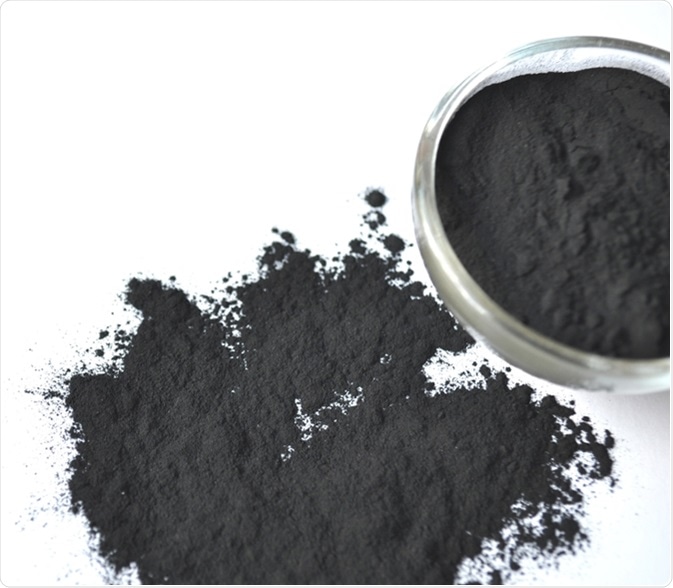Activated charcoal is a special type of fine black powder made from materials such as charred bones, coal, petroleum coke, and coconut shells, among others.

Activated charcoal in a glass bowl and sprinkled around. Image Credit: Akvals / Shutterstock
Activated Charcoal Mechanism
Carbon-rich materials such as wood are burnt at very high temperatures to obtain charcoal (a nearly pure form of carbon). Once the charcoal is obtained, it is passed through a variety of chemical processes in order to “activate” it. This includes treatment with oxygen, steam, certain acids, and carbon dioxide among other chemicals.
The activation process removes any impurities and produces fine black porous granules. It also creates numerous holes and crevices on charcoal particles. Thus, the overall surface area tremendously increases (approximately 1000m2 per gram). The unique voluminous and porous structure of activated charcoal makes it the most suitable candidate for surface binding (adsorption).
Due to the excellent adsorbent nature, activated charcoal can trap many toxins and chemical molecules. Other than the physical adsorption phenomenon, the porous structure of activated charcoal is also helpful because of its negative electrical charge. It pulls positively charged toxins and gases. These molecules are then trapped inside the intricate meshwork of crevices and holes in the activated charcoal.
Hence, the absorption of toxins into the bloodstream is prevented. Moreover, the activated charcoal is not absorbed by human body, so it is excreted from the body along with the adsorbed toxins on its surface.
Activated Charcoal History
The adsorbent properties of charcoal have been in knowledge since the 18th century. It has been conventionally used for filtration in water treatment plants.
During the early 1800s AD, the scientists demonstrated the efficacy of charcoal in the prevention of poisoning in humans and animals. Among the earliest documented instances is one of a French scientist Bertrand in 1813 AD, wherein he self-administered arsenic trioxide (a potent toxin) along with charcoal powder and survived. In 1831 AD, Tovery swallowed a lethal dose of strychnine mixed with charcoal and suffered no adverse effects of strychnine overdose. Similarly, in 1834 AD, another physician Hort, saved the life of a patient who had taken mercury bichloride, by oral administration of charcoal.
The adsorptive characteristics of charcoal were further explored over the next 150 years. Several researchers have demonstrated refinement and purification processes to enhance the porous nature of charcoal. Despite a significant amount of work in this domain, activated charcoal received a universal recognition for its clinical benefits only in the past fifty years. Administration of activated charcoal powder with water or sweetened liquid has been since in wide use to prevent the toxins from entering the systemic circulation.
Applications and Benefits
Activated charcoal is most frequently used as an antidote to an overdose of several over-the-counter drugs such as analgesics. The timing of administering activated charcoal in poisoning cases can make a difference of life and death.
Activated charcoal should be administered as soon as possible, about 1 to 2 hours upon exposure to the poisonous chemical or substance.
It also promotes kidney function by adsorbing a substantial amount of impurities and excreting them in feces. Therefore, kidneys have to work less vigorously. Additionally, it is useful in reducing unpleasant urine odors.
Because of the ability to bind with cholesterol and bile acids, it is also useful in adsorption of cholesterol. The other applications of activated charcoal include water filtration, teeth whitening, reduce gas and bloating, and skin treatment.
Side Effects of Activated Charcoal
Activated charcoal is generally well-tolerated. Several studies have demonstrated its successful application for gastrointestinal decontamination in emergency cases.
However, common side effects such as nausea and vomiting exist. These can be attributed to the coarse texture of the liquid mixture of activated charcoal. Nausea and vomiting can become more profound when the patient is in a semi-conscious state due to the poisoning.
Scientists have also claimed many instances of side effects to having occurred due to the residual toxic impurities of the improperly processed or home-made activated charcoal.
Moreover, activated charcoal may result in adverse effects if aspirated into the lungs. It is then important to ensure that the nasogastric tube is positioned properly. To do this, a chest X-ray is usually recommended to ensure that the tube is not in the lungs.
Activated charcoal is not effective in the treatment of poisoning related to substances such as corrosive acids, alkalis, hydrocarbons, alcohol, boric acid and heavy metals such as lead, potassium, lithium, and iron compounds.
Further Reading